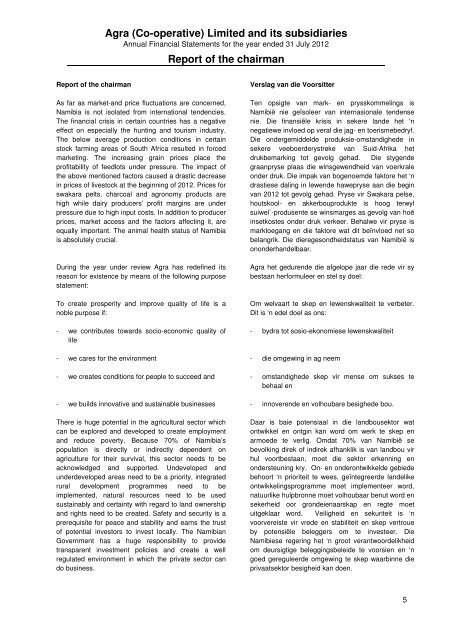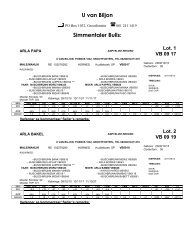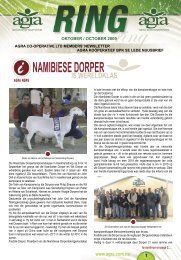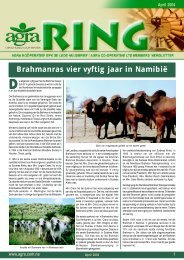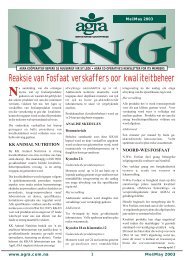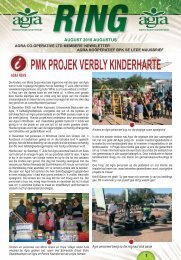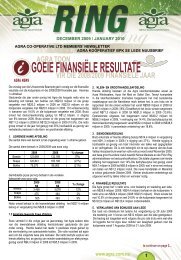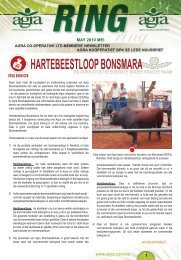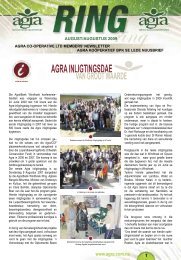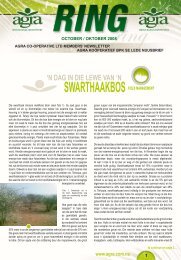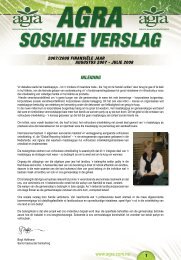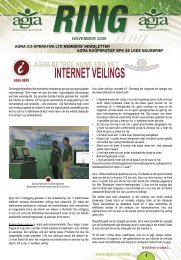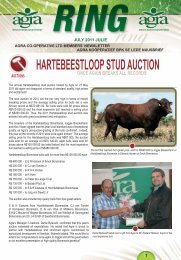Complete 2012 Annual Report - Agra
Complete 2012 Annual Report - Agra
Complete 2012 Annual Report - Agra
You also want an ePaper? Increase the reach of your titles
YUMPU automatically turns print PDFs into web optimized ePapers that Google loves.
<strong>Report</strong> of the chairman<br />
<strong>Agra</strong> (Co-operative) Limited and its subsidiaries<br />
<strong>Annual</strong> Financial Statements for the year ended 31 July <strong>2012</strong><br />
<strong>Report</strong> of the chairman<br />
As far as market-and price fluctuations are concerned,<br />
Namibia is not isolated from international tendencies.<br />
The financial crisis in certain countries has a negative<br />
effect on especially the hunting and tourism industry.<br />
The below average production conditions in certain<br />
stock farming areas of South Africa resulted in forced<br />
marketing. The increasing grain prices place the<br />
profitability of feedlots under pressure. The impact of<br />
the above mentioned factors caused a drastic decrease<br />
in prices of livestock at the beginning of <strong>2012</strong>. Prices for<br />
swakara pelts, charcoal and agronomy products are<br />
high while dairy producers’ profit margins are under<br />
pressure due to high input costs. In addition to producer<br />
prices, market access and the factors affecting it, are<br />
equally important. The animal health status of Namibia<br />
is absolutely crucial.<br />
During the year under review <strong>Agra</strong> has redefined its<br />
reason for existence by means of the following purpose<br />
statement:<br />
To create prosperity and improve quality of life is a<br />
noble purpose if:<br />
- we contributes towards socio-economic quality of<br />
life<br />
- we cares for the environment<br />
- we creates conditions for people to succeed and<br />
- we builds innovative and sustainable businesses<br />
There is huge potential in the agricultural sector which<br />
can be explored and developed to create employment<br />
and reduce poverty. Because 70% of Namibia’s<br />
population is directly or indirectly dependent on<br />
agriculture for their survival, this sector needs to be<br />
acknowledged and supported. Undeveloped and<br />
underdeveloped areas need to be a priority, integrated<br />
rural development programmes need to be<br />
implemented, natural resources need to be used<br />
sustainably and certainty with regard to land ownership<br />
and rights need to be created. Safety and security is a<br />
prerequisite for peace and stability and earns the trust<br />
of potential investors to invest locally. The Namibian<br />
Government has a huge responsibility to provide<br />
transparent investment policies and create a well<br />
regulated environment in which the private sector can<br />
do business.<br />
Verslag van die Voorsitter<br />
Ten opsigte van mark- en prysskommelings is<br />
Namibië nie geïsoleer van internasionale tendense<br />
nie. Die finansiële krisis in sekere lande het ‘n<br />
negatiewe invloed op veral die jag- en toerismebedryf.<br />
Die ondergemiddelde produksie-omstandighede in<br />
sekere veeboerderystreke van Suid-Afrika het<br />
drukbemarking tot gevolg gehad. Die stygende<br />
graanpryse plaas die winsgewendheid van voerkrale<br />
onder druk. Die impak van bogenoemde faktore het ‘n<br />
drastiese daling in lewende hawepryse aan die begin<br />
van <strong>2012</strong> tot gevolg gehad. Pryse vir Swakara pelse,<br />
houtskool- en akkerbouprodukte is hoog terwyl<br />
suiwel`-produsente se winsmarges as gevolg van hoë<br />
insetkostes onder druk verkeer. Behalwe vir pryse is<br />
marktoegang en die faktore wat dit beïnvloed net so<br />
belangrik. Die dieregesondheidstatus van Namibië is<br />
ononderhandelbaar.<br />
<strong>Agra</strong> het gedurende die afgelope jaar die rede vir sy<br />
bestaan herformuleer en stel sy doel:<br />
Om welvaart te skep en lewenskwaliteit te verbeter.<br />
Dit is ‘n edel doel as ons:<br />
- bydra tot sosio-ekonomiese lewenskwaliteit<br />
- die omgewing in ag neem<br />
- omstandighede skep vir mense om sukses te<br />
behaal en<br />
- innoverende en volhoubare besighede bou.<br />
Daar is baie potensiaal in die landbousektor wat<br />
ontwikkel en ontgin kan word om werk te skep en<br />
armoede te verlig. Omdat 70% van Namibië se<br />
bevolking direk of indirek afhanklik is van landbou vir<br />
hul voortbestaan, moet die sektor erkenning en<br />
ondersteuning kry. On- en onderontwikkelde gebiede<br />
behoort ‘n prioriteit te wees, geïntegreerde landelike<br />
ontwikkelingsprogramme moet implementeer word,<br />
natuurlike hulpbronne moet volhoubaar benut word en<br />
sekerheid oor grondeienaarskap en regte moet<br />
uitgeklaar word. Veiligheid en sekuriteit is ‘n<br />
voorvereiste vir vrede en stabiliteit en skep vertroue<br />
by potensiële beleggers om te investeer. Die<br />
Namibiese regering het ‘n groot verantwoordelikheid<br />
om deursigtige beleggingsbeleide te voorsien en ‘n<br />
goed gereguleerde omgewing te skep waarbinne die<br />
privaatsektor besigheid kan doen.<br />
5


